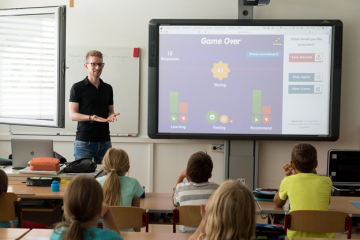What’s the first word that comes to mind when you think of homeschooling? Depending on your perspective, your answer might range from “quirky” to “trendy” or maybe even “brave,” but the word “rare” is probably much further down the list than it would be had I asked you the question a few decades ago.
It’s true—homeschooling is on the rise. According to the National Home Education Research Institute (NHERI), there are now more than 2 million homeschooled children in the United States, and this percentage is continuing to climb at an estimated 2 to 4 percent per year.
Why Homeschooling?
There may be as many different reasons why parents choose to homeschool as there are homeschooled children, but as a general rule, parents cite one or more of the following reasons for circumventing the public school system and managing their youngster’s education at home:

- Religious beliefs
- Family values
- The child’s individual needs
- Disappointment with academic standards
- Concern over school/teacher quality
- Fear of bullying, violence, peer pressure, or other issues related to the school environment
Religious Beliefs and Family Values
Homeschooling was pioneered by parents who desired a religious education for their children—one that incorporates spirituality and religious doctrine into the curriculum alongside reading, writing, and arithmetic. Religion is still one of the primary reasons parents choose to homeschool today. As legislators continue to take more targeted measures to take God out of the school system, those with strong religious beliefs will likely seek other sources of education such as private school and homeschooling.
Even atheists homeschool their children, however, so there’s more to the trend than just religion. Many parents who don’t consider themselves religious or affiliate themselves with a certain denomination still seek a learning environment for their children that emphasizes their own personal values, rather than those taught through school-wide “character education” initiatives.
Needs of the Child
Other parents cite the individual needs of their child as the primary reason for choosing homeschooling over the public education system. Since every public school has special education programs, why do parents find it necessary to educate their own children rather than subscribing them to these specialized programs?
There could be a couple of reasons for this: either parents are finding these special education programs inadequate, or children who do not meet the requirements for these special needs programs aren’t having their needs met within the traditional classroom setting. Although both of these reasons could very well be contributing to the rise of homeschooling, the latter seems particularly interesting. With the overcrowding in today’s classrooms coupled with shrinking teacher salaries, it comes as no surprise that some children may be slipping through the cracks. Perhaps this is one of the reasons we’re seeing more and more homeschoolers across various demographics?
School Quality Issues
As I mentioned, many parents have either foregone the public education system altogether or pulled their children out of school in favor of homeschooling as a result of concern over school quality. Whether it be the quality of academic standards in general or specific concerns over teacher quality, school quality, or issues surrounding the learning environment such as bullying, violence, or peer pressure, many parents believe they can do a better job of educating their children that the public education system can.
Have you considered homeschooling for any of these reasons, or another reason altogether? Let us know in the comments section below.




2 Comments
Tracy Hanson · July 30, 2012 at 4:24 am
There is nothing “quirky” about homeschooling nor are families primarily homeschooling for religious reasons any more. They do it because they are fed up with the public schools as well as for the safety of their children. Unfortunately, other then getting them out of poor social situations, most aren’t doing anything differently from the schools. They too often use miss-fitted text books, workbooks and worksheets. Some families may enhance with field trips but unfortunately not many.
K12 Next Generation believes that HOW we deliver education is what is at fault and when we can change that then children will successfully learn in any educational model. So, what is the HOW? It involved 3 things.:
1) It is recognized that we don’t all learn the same way or at the same pace yet we continue to arbitrarily group kids together by age (referred to as grade levels) These levels are removed to allow students to flow seamlessly through the curriculum by demonstrating mastery of concepts.
2) Teachers are trained to lead groups of students in learning. They have so much material to get through and attempt to do so whether all the children are ready or not. We believe that this is the main cause for the rising behavior issues in the schools; frustration and boredom. Instead, teachers need to learn how to become coaches, facilitators, mentors – to individual students. They need to give the responsibility of learning back to the students being ready to help when they falter.
3) They need a tool use to make this all happen. That is what K12 Next Generation, educators from around the world, how to design; a global curriculum continuum that is engaging, interactive, flexible and fun, that incorporates the various learning styes and allows students to move through at their own pace. No textbooks but Open Educational Resources are used to develop the curriculum uses the Common Core and International standards as its foundation. A global curriculum developed by a global community of educators and individuals for a global group of learners. It is a collaboration that will make everyone winners.
The problem? People would rather stay in their own “holes” doing the same thing everyone else in their “holes” are doing rather then banned together. There are some wonderful things happening in education around the world yet they generally go unnoticed and are making little to no impact on the quality of education. However, if we joined together all the pieces, the picture would come into focus and change will occur.
Where a child learns will no longer be an issue for this tool would be available to all.
In ending, I urge you and all others reading this to visit our site, join and help us build a better way.
Tammy Bennecke · July 30, 2012 at 7:09 am
Thank you for your comments Tracy. I agree the current one-size-fits-all U.S. public education system desperately needs to be overhauled. Your mission for K12 Next Generation is commendable, and I can feel your passion for it. I have shared your page on Twitter and Pinterest.
Comments are closed.